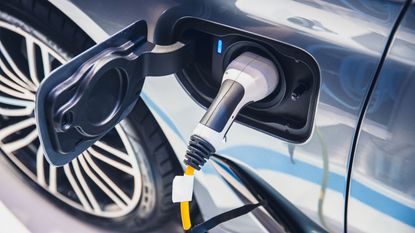Stricter Electric Vehicle Tax Credit Rules Begin April 18
New battery component and critical mineral rules for the federal EV tax credit mean that very few EVs are currently eligible for the full $7,500 tax break.
- (opens in new tab)
- (opens in new tab)
- (opens in new tab)
- Newsletter sign up Newsletter


Eagerly anticipated federal guidance on the EV tax credit was released last month that limits which electric vehicles qualify for the $7,500 tax credit under the Inflation Reduction Act (IRA). The proposed rules set out requirements for critical minerals and battery components that must be met for an EV or “clean vehicle” to qualify for the full $7,500 tax credit. Vehicles that don’t meet all of the requirements could end up being eligible for only half the tax credit ($3,750), or in some cases, no credit at all.
The Treasury Department, in a statement, described the clean vehicle guidance as “an important step that will help consumers save up to $7,500 on a new clean vehicle and hundreds of dollars per year on gas, while creating American manufacturing jobs and strengthening our energy and national security.”
As of April 18, only a few EVs qualify for the full $7,500 tax credit. Some electric vehicles that don’t qualify include about nine models from mostly foreign manufacturers like Hyundai, Volkswagen, BMW, Rivian, Nissan, and Volvo.

Sign up for Kiplinger’s Free E-Newsletters
Profit and prosper with the best of expert advice on investing, taxes, retirement, personal finance and more - straight to your e-mail.
Profit and prosper with the best of expert advice - straight to your e-mail.
Some Tesla models, like the Model Y and the Model 3 Performance, are eligible for the full EV credit, other Tesla EVs are only eligible for half the credit or $3,750. The full list of vehicles qualifying for some or all of the tax credit amount can be found on the government's fuel economy website (opens in new tab).
Meanwhile, Sen. Joe Manchin (D-WV), recently threatened to sue the Treasury over the implementation of the EV tax credit, over concern that the clean vehicle rules provide too much flexibility for overseas manufacturers.
“It is horrific that the [Biden] Administration continues to ignore the purpose of the law which is to bring manufacturing back to America and ensure we have reliable and secure supply chains,” Manchin said in a statement regarding the proposed rules, and the IRA.
Note: The Inflation Reduction Act — massive climate, energy, tax, and healthcare legislation — was passed along Democratic party lines last year. The law contains billions of dollars in clean energy tax incentives and $80 billion in funding for the IRS.
New EV Credit Sourcing Rules
Under the IRA, the maximum clean vehicle credit is $7,500 per vehicle, but half that amount applies to vehicles that meet critical mineral component requirements. The other half applies to vehicles that meet battery component requirements. Vehicles that meet both battery and critical mineral requirements would qualify for the full EV tax credit for 2023.
- Critical Mineral Requirement. This year, 40% of the critical minerals contained in a credit-eligible EV battery need to be extracted or processed in the U.S. or a free trade country, or recycled in North America. The applicable percentages would go up by 10% each year after 2023, until 2027, when the applicable percentage would reach 80%.
- Battery Component Requirements. The component portion of the EV tax credit equation also increases over time. The applicable percentage of the battery required to be sourced in North America for purposes of the tax credit, starts at 50% this year. Each year after, the percentage would incrementally increase, and ultimately reach 100% by 2029.
The critical minerals and battery guidance released March 31 by the IRS are proposed rules. There is a 60-day public comment period before the rules become final. However, the battery and critical mineral component requirements will apply as of April 18, 2023. As of April 18, few electric vehicles qualify for the full $7,500 tax credit than qualified on April 17.
If you’re in the market for an electric car or EV SUV this year and hope to get a tax break on the purchase, keep an eye on the IRS list of qualifying vehicles. That list will change as time goes on and your favorite EV may become eligible for the full tax credit. Stay tuned to Kiplinger.

With more than 20 years of experience as a corporate attorney and business journalist, Kelley R. Taylor has contributed to numerous national print and digital magazines on key issues spanning education, law, health, finance, and tax. Over the years, Kelley has extensively covered major tax developments and changes including the "Trump" tax cuts (TCJA), pandemic-era changes in ARPA, the SECURE 2.0 Act, and the numerous clean energy tax credits in the Inflation Reduction Act. Kelley particularly enjoys translating complex information in ways that help empower people in their daily lives and work.
-
-
 Deeper Regional Banking Crisis Unlikely after Triple Failure: Kiplinger Economic Forecasts
Deeper Regional Banking Crisis Unlikely after Triple Failure: Kiplinger Economic ForecastsEconomic Forecasts Deeper Regional Banking Crisis Unlikely after Triple Failure: Kiplinger Economic Forecasts
By Rodrigo Sermeño • Published
-
 Spending Cuts Could Trigger Deeper Slowdown: Kiplinger Economic Forecasts
Spending Cuts Could Trigger Deeper Slowdown: Kiplinger Economic ForecastsEconomic Forecasts Spending Cuts Could Trigger Deeper Slowdown: Kiplinger Economic Forecasts
By David Payne • Published

